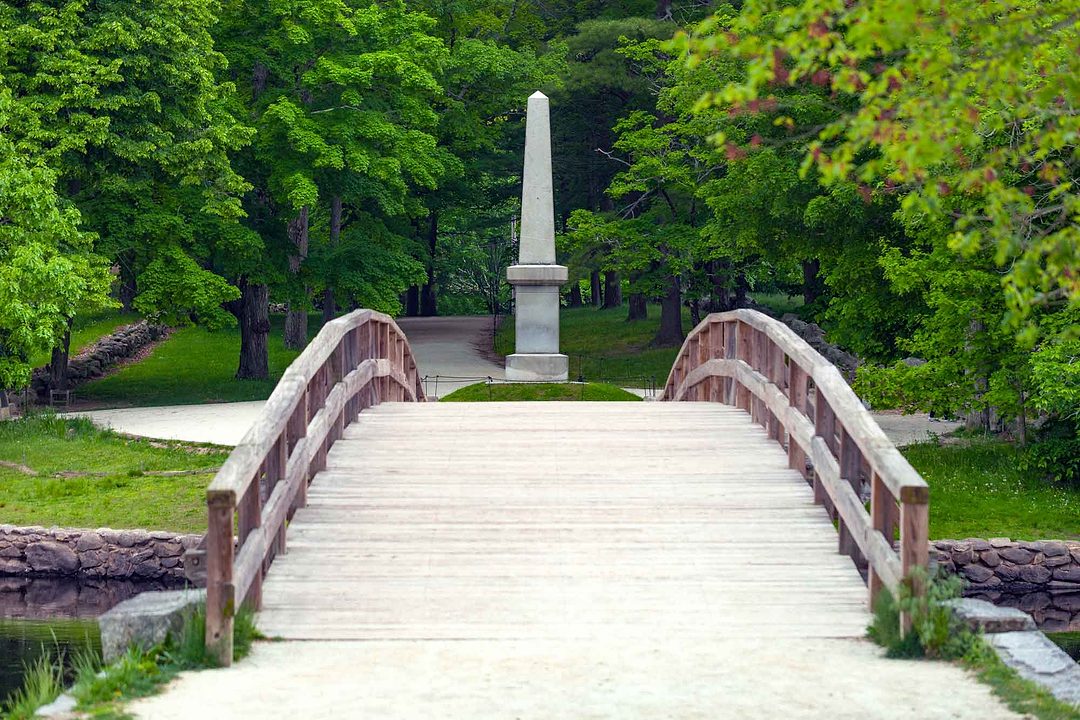Wanderlust became a real thing for many during the pandemic. As a result, people found themselves pining to take trips they had put off previously. Now, as travel returns, we welcome you to Concord. Whether you are in town for an afternoon, are a day-tripper, or can spend an entire weekend in town, don’t worry. We have you covered.
If You Have a Half Day
Spending a half-day in Concord is just enough time to learn about the two revolutions that occurred in our town. The first revolution to know is the American Revolution. Park downtown in one of the free parking lots and saunter up Monument Street to Minute Man National Historical Park. The flat, 1.2 mile walk on paved and crushed stone sidewalks should take about 20 minutes. As you make your way up Monument Street, visualize farmland as all the houses between the Colonial Inn and the Elisha Jones House had not yet been built. Additionally, imagine a lot fewer trees.
Concord was founded in 1635, just five years after Boston. It was the first inland settlement of the colony of Massachusetts, where one could not smell the ocean. So, what did the first Concordians use to build their homes? Trees. How did they heat their homes? Trees. And, since the colony of Massachusetts had a coast, many trees were used to build ships. By 1775, the town was 80% deforested. Therefore, the shady trees that protect you from the summer sun on your saunter along Monument Street would not have been here almost 250 years ago.
About seven-tenths of a mile up the road, you will see the yellow Elisha Jones house. On April 19, the ell of this home had 17,000 pounds of salted cod in its basement. The Regular Army came to Concord to that day to seize munitions and supplies, including food. Today, the National Park Service owns this silent witness house. A little further up the sidewalk on your left will be the Old Manse, a property owned and operated by The Trustees of Reservations that was also a silent witness to the revolution on April 19, 1775.
While not part of Minute Man National Historical Park, the Old Manse played a prominent role in the revolution. The patriot preacher, William Emerson, and his family lived there. His wife and children watched the battle from an upstairs window. Just past the Old Manse is the entrance to the National Park.
Follow the dirt path down to see the monument erected in 1836 to pay homage to the men that fought on April 19, 1775. Next, see the the Old North Bridge, which has been rebuilt five times. Across the bridge, you can see the Minute Man Statue, by sculptor Daniel Chester French. Continue to follow the dirt road up to the air-conditioned North Bridge Visitor Center, where you can watch a short movie, view artifacts, and speak to Park Rangers.
When you have had your fill of the American Revolution, return downtown via Monument Street. Once you are near the Colonial Inn, cross Monument Street to Court Lane to visit Sleepy Hollow Cemetery. There you will learn about the second revolution that occurred in Concord, the Literary Revolution.

Ralph Waldo Emerson’s grave
| Wikimedia.orgRalph Waldo Emerson is the grandson of our patriot preacher, William Emerson. Before Ralph Waldo Emerson, Concord was where the “shot heard ‘round the world” happened. After his arrival in town and his success as a philosopher, author, and lyceum speaker, he became the voice heard ‘round the world. Because of him, notable figures of the day chose to visit Concord. To walk to his grave, you will start at the beginning of the nearly 100-acre cemetery.
Sleepy Hollow is still an active public cemetery, so be on the lookout for cars and funerals. You will enter the cemetery near the Assessor’s Office on Court Street. Once there, how do you know what to look at and where to go? Don’t worry. The Town of Concord has created an interactive guided tour, and the QR code is on maps on display in Sleepy Hollow Cemetery. You can peruse who is buried there and decide which graves you wish to visit as you make your way to the literary luminaries buried on Authors Ridge: Henry David Thoreau, Nathaniel Hawthorne, Louisa May Alcott, and Ralph Waldo Emerson. When your pilgrimage is complete, take the same route out of the cemetery. Then you are free to find a bite to eat downtown, shop for souvenirs or books, or make a mental note on your way out of town to book a hotel room to spend more time here.

The April 19, 1775 gallery at Concord Museum
| Courtesy of Concord MuseumIf You Have a Full Day
If you can spend a full day discovering Concord, visiting the Concord Museum perfectly complements the half-day of learning about Concord’s two revolutions outlined above. The recently renovated museum has 18 galleries, including the April 19, 1775 gallery, the museum’s star exhibit. On display in the center of the room is one of the two lanterns used as a signal to Paul Revere in the Old North Church on the night of April 18, 1775. While the sounds of the battle echo, a 12 by 7-foot map and media piece provides a birds-eye view of the events on April 19, 1775. Visitors can watch as 24 hours of history unfolds in six minutes! Trust me; you will want to watch it. While you’re there, learn more about Concord’s literary revolution and see artifacts that belonged to Ralph Waldo Emerson and Henry David Thoreau.
If You Have a Weekend
Naturally, spending a weekend in Concord allows you to discover almost everything! After immersing yourself in the American and Literary Revolutions, you can spend a day taking guided tours of literary houses.
Virginia Road is where Thoreau Farm, the house where Henry David Thoreau was born, still stands today. Louisa May Alcott’s Orchard House is located on Lexington Road and allows fans of the author to visit one of the homes she and her family lived in in Concord. Bush, Ralph Waldo Emerson’s home, is just a half-mile down Lexington Road. Finally, the Old Manse is on Monument Street next to Minute Man National Historical Park. Here, you can learn about the American Revolution, the Literary Revolution, and the fascinating authors who spent time visiting or living at the Old Manse.
Finally, for some, a trip to Concord would not be complete without a visit to Walden Pond. If you want to be part of the transcendentalist walking club, you can take the Emerson-Thoreau Amble from Lexington Road to Walden Pond. It is about a two-mile hike. Just remember, you will have to walk the same distance back.
Hopefully, this sample of self-guided excursions in town whets your appetite to discover Concord. The historic sites in town cater to multiple interests and usually can please just about everyone in a family. Choose to explore Concord the next time you travel and suffer from wanderlust no more!
If you prefer to explore Concord with an expert
Both the Visitor Center and Minute Man National Historical Park offer a range of fascinating tours.
Concord’s Visitor Center tours include “Concord’s Art Legacy: Women in Art Revealed,” “African American History of Concord,” “Indigenous People of Concord,” “Historic Walking Tour,” “Little Women,” “Women of Concord,” “Emerson-Thoreau Amble,” “Three Cemeteries,” and “West Concord History.” Go to visitconcord.org/visit/visitor-center/#walking-tours-schedule for more information.
Minute Man National Historical Park tours include “Battlefield in a Box,” “Concord’s North Bridge: History and Memory,” “The Minute Men: Neighbors in Arms,” “North Bridge Battlefield Walk,” and “Discovering Lexington’s Lost Battlefield.” For more information visit nps.gov/mima/planyourvisit/ranger-programs-and-tours.htm


